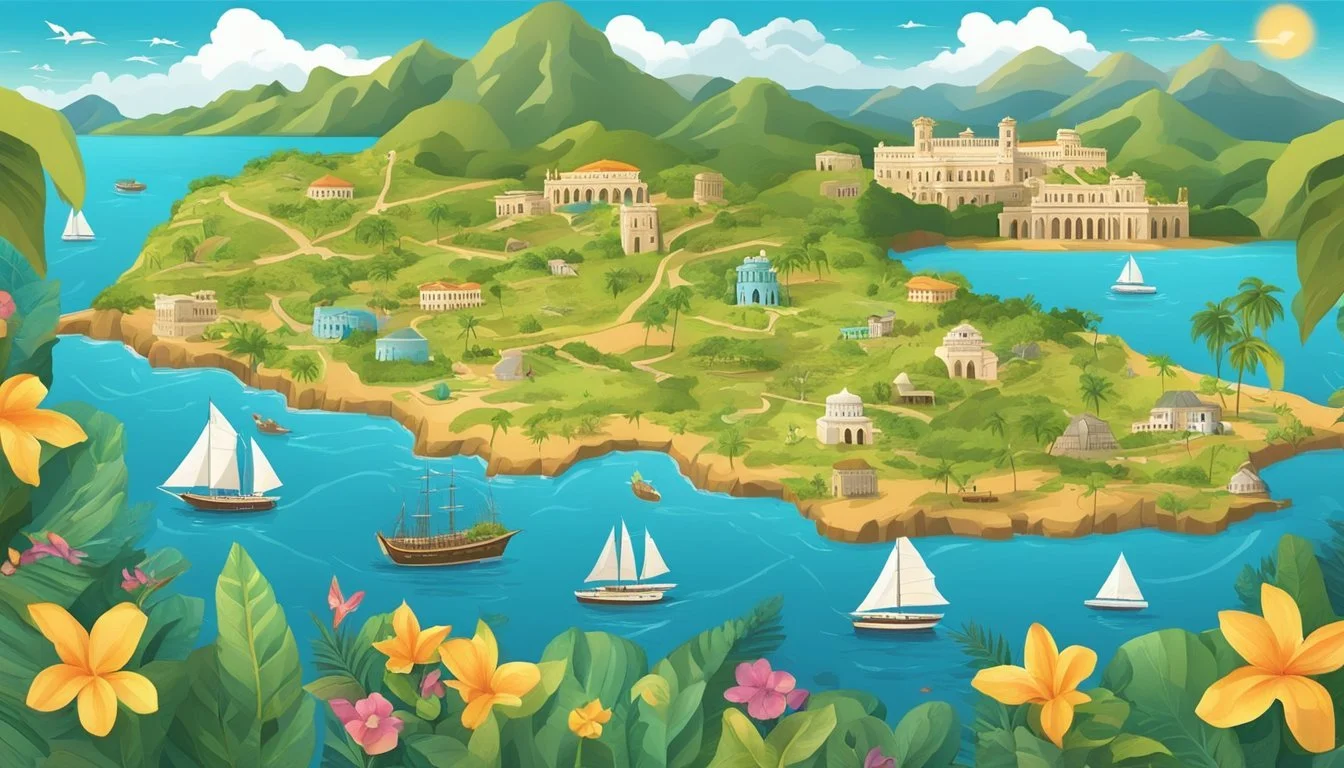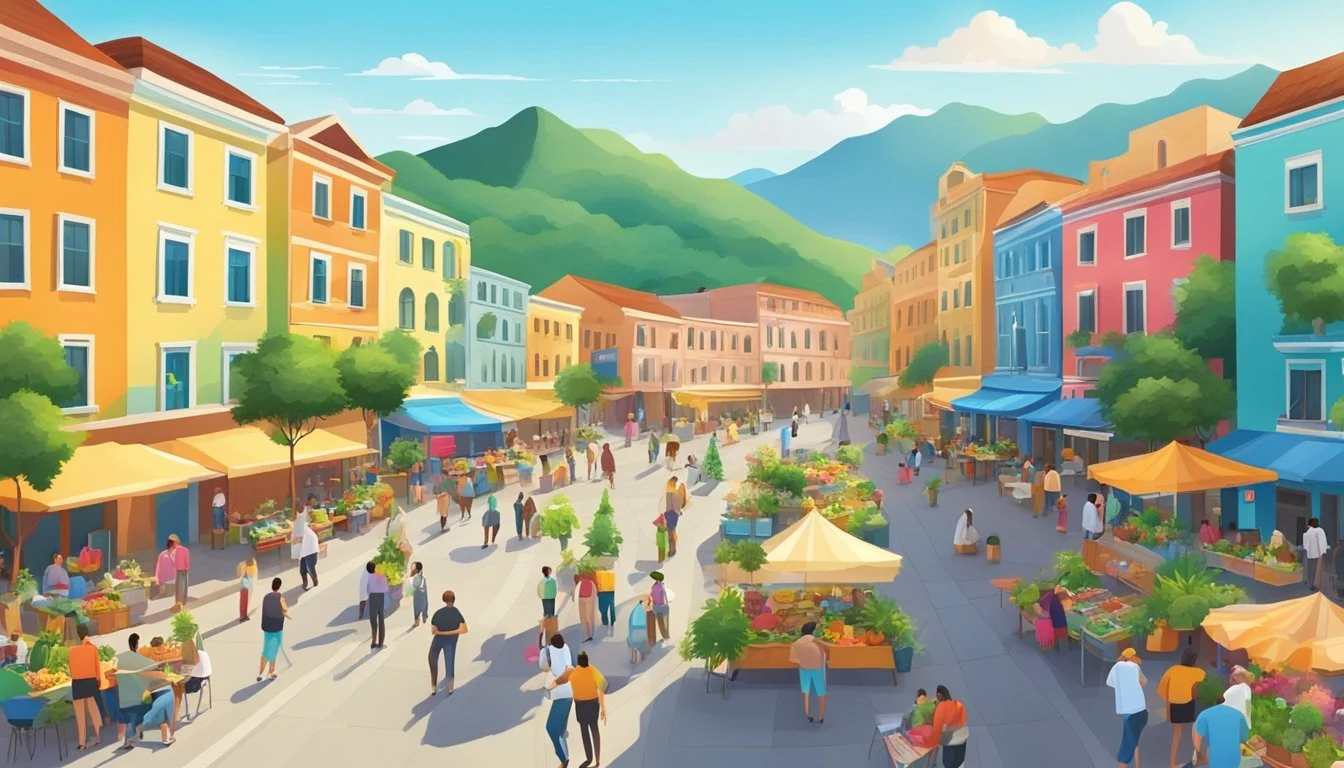5 Insightful Documentaries on Puerto Rico
Exploring the Island's Culture and History
Documentaries offer a powerful lens through which to view and understand Puerto Rico's complex history, culture, and challenges. These films provide valuable insights into the island's social, political, and environmental landscape, allowing viewers to gain a deeper appreciation for Puerto Rico's unique identity and ongoing struggles.
Several compelling documentaries have emerged in recent years, shedding light on various aspects of Puerto Rican life and society. From the aftermath of natural disasters to political upheavals and cultural traditions, these films capture the resilience and spirit of the Puerto Rican people. By exploring diverse topics, they contribute to a more nuanced understanding of the island's past, present, and future.
1) '¡Así es la vida en Puerto Rico!' by José López
'¡Así es la vida en Puerto Rico!' is a documentary by José López that offers an intimate look at daily life in Puerto Rico. The film explores the unique cultural identity of the island and its people.
López's camera captures the vibrant streets, bustling markets, and serene beaches that define Puerto Rico's landscape. Through interviews with locals, the documentary sheds light on the challenges and joys of island living.
The film touches on important aspects of Puerto Rican culture, including traditional cuisine, music, and festivals. It also addresses the complex relationship between Puerto Rico and the United States.
López's documentary provides a balanced perspective on life in Puerto Rico, showcasing both the positive aspects and the difficulties faced by residents. The filmmaker's approach allows viewers to gain a nuanced understanding of Puerto Rican society.
'¡Así es la vida en Puerto Rico!' stands out for its authenticity and attention to detail. By focusing on everyday experiences, López creates a compelling portrait of Puerto Rico that goes beyond tourist attractions.
2) 'La Casa Blanca: Puerto Rico's Federal Problem' by Ricardo Martínez
Ricardo Martínez's documentary 'La Casa Blanca: Puerto Rico's Federal Problem' offers a critical examination of the complex relationship between Puerto Rico and the United States federal government. The film explores the island's unique political status as an unincorporated territory.
Martínez delves into the historical context of Puerto Rico's connection to the U.S., tracing it back to the Spanish-American War. He highlights the ongoing debate surrounding Puerto Rico's political future, including options like statehood, independence, or maintaining its current status.
The documentary features interviews with Puerto Rican political leaders, activists, and everyday citizens. These diverse perspectives provide insight into the varying opinions on the island's relationship with the federal government.
'La Casa Blanca' also addresses the economic challenges facing Puerto Rico, including its debt crisis and the impact of federal policies on the island's economy. Martínez examines how these issues affect Puerto Ricans' daily lives and their views on the island's political status.
The film raises important questions about democracy, representation, and self-determination for Puerto Rico's residents. It presents a balanced view of the complex issues surrounding Puerto Rico's relationship with the United States.
3) 'The Forgotten Hurricane: Puerto Rico's Struggle with María' by Ana Cruz
Ana Cruz's documentary 'The Forgotten Hurricane: Puerto Rico's Struggle with María' offers a poignant look at the aftermath of Hurricane Maria in Puerto Rico. The film explores the challenges faced by Puerto Ricans in the year following the devastating Category 4 storm.
Cruz's camera captures the daily struggles of residents as they cope with damaged infrastructure and limited resources. The documentary highlights the slow pace of recovery and the frustrations of those feeling abandoned by relief efforts.
Through interviews with local officials, including San Juan Mayor Carmen Yulín Cruz, the film provides insight into the government's response and the difficulties of coordinating aid. It also showcases the resilience of Puerto Ricans as they work to rebuild their communities.
The documentary brings attention to Puerto Rico's status as a U.S. territory and how this affected the disaster response. It raises questions about the island's relationship with the mainland and its impact on recovery efforts.
Cruz's work serves as a powerful reminder of the long-term effects of natural disasters and the importance of sustained support for affected areas. The film stands as a testament to the strength of Puerto Rico's people in the face of unprecedented challenges.
4) 'El Camino al Futuro: Renewable Energy in Puerto Rico' by Mateo Rivera
'El Camino al Futuro: Renewable Energy in Puerto Rico' is a documentary that explores Puerto Rico's ambitious goal of achieving 100% renewable energy by 2050. Filmmaker Mateo Rivera captures the island's transition towards sustainable power sources.
The film highlights Puerto Rico's commitment to renewable energy as established in the Puerto Rico Energy Public Policy Act (Act 17). It showcases various initiatives and technologies being implemented across the island.
Rivera's documentary examines the potential of solar, wind, and other clean energy resources in meeting Puerto Rico's electricity demands. It features interviews with local leaders, energy experts, and community members involved in the transition.
The film also addresses the challenges Puerto Rico faces in modernizing its power grid and increasing resilience against natural disasters. It explores the role of distributed generation and energy storage in creating a more robust electrical system.
'El Camino al Futuro' provides viewers with a comprehensive look at Puerto Rico's renewable energy landscape. It offers insights into the technological, economic, and social aspects of this significant transformation.
5) 'Boricua Diaspora: Stories of Exile and Return' by Carmen Delgado
'Boricua Diaspora: Stories of Exile and Return' is a compelling documentary by Carmen Delgado that explores the experiences of Puerto Ricans living in the United States. The film sheds light on the complex relationship between Puerto Rico and the mainland U.S.
Delgado interviews various members of the Puerto Rican diaspora, capturing their personal stories of migration, cultural adaptation, and identity formation. The documentary showcases the challenges faced by Puerto Ricans in navigating life between two cultures.
The film also examines the concept of return migration, as some individuals choose to move back to Puerto Rico. It highlights the emotional and practical difficulties of reconnecting with one's roots after years away from the island.
'Boricua Diaspora' offers a nuanced perspective on the Puerto Rican experience in the United States. It touches on themes of colonialism, citizenship, and cultural preservation, providing viewers with a deeper understanding of the diaspora's impact on both Puerto Rico and the U.S.
Through its intimate portraits and thoughtful analysis, the documentary contributes to the ongoing dialogue about Puerto Rican identity and the island's relationship with the United States.
Cultural Significance of Puerto Rico
Puerto Rico's cultural heritage blends indigenous Taíno, Spanish colonial, and African influences. This unique mix shapes the island's identity through language, traditions, and artistic expressions.
Historical Context
Puerto Rico's cultural tapestry reflects centuries of diverse influences. The Taíno people, the island's original inhabitants, left their mark on agriculture, language, and customs. Spanish colonization brought Catholicism, architecture, and the Spanish language.
African traditions, introduced through the slave trade, contributed to music, dance, and spiritual practices. This fusion created a distinct Puerto Rican identity. The island's status as a U.S. territory since 1898 has added another layer of cultural complexity.
Influence on Music and Art
Puerto Rican music genres like bomba, plena, and salsa showcase the island's rich cultural heritage. Bomba, with African roots, features call-and-response vocals and energetic drumming. Plena, known as the "sung newspaper," tells stories of daily life.
Visual arts in Puerto Rico reflect its history and natural beauty. Painters like Francisco Oller and Ramón Frade captured island life in vibrant colors. Modern artists continue to explore themes of identity and politics.
Puerto Rican literature has gained international recognition. Writers like Julia de Burgos and Luis Palés Matos have contributed to the island's literary legacy, often addressing themes of national identity and social issues.
Economic Challenges and Developments
Puerto Rico faces significant economic hurdles while also experiencing areas of potential growth. Natural disasters have severely impacted the island's economy, yet tourism continues to play a vital role in its development.
Impact of Natural Disasters
Hurricane Maria in 2017 devastated Puerto Rico's economy, causing $96 billion in damages. The storm destroyed critical infrastructure and led to widespread business closures. Over 4,600 lives were lost, further straining the island's resources.
Recovery efforts have been slow and complicated by Puerto Rico's complex political status. The hurricane exposed long-standing economic vulnerabilities and exacerbated existing challenges.
Despite setbacks, some positive indicators emerged. In January 2021, the Economic Activity Index showed robust growth, signaling potential economic recovery.
Tourism and Growth
Tourism remains a crucial driver of Puerto Rico's economy. The industry has shown resilience in the face of natural disasters and economic uncertainties.
Efforts to revitalize tourism include:
Promotion of eco-tourism
Investment in infrastructure improvements
Marketing campaigns highlighting cultural attractions
The government has also focused on diversifying the economy beyond tourism. Initiatives to attract businesses in technology, manufacturing, and renewable energy sectors aim to create new job opportunities and stimulate economic growth.
These efforts face challenges, including competition from other Caribbean destinations and the need for sustained investment in infrastructure and workforce development.






